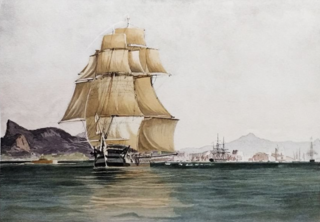Related Research Articles
Six ships that were built for the Royal Navy have borne the name HMS Ocean. The name Ocean entered the list from which names are selected for British ships in 1759, when the Royal Navy captured the French ship named Océan. The British studied the French technology of this ship and admired it, but the ship had to be in bad shape before it would be replaced by a new-build.
Eight vessels of the Royal Navy have been named HMS Triton or HMS Tryton, after Triton, the son of Poseidon and Amphitrite, and the personification of the roaring waters:
Sixteen ships of the Royal Navy have been named HMS Mermaid after the mermaid:
Eight ships of the Royal Navy have borne the name HMS Northumberland after the English county of Northumberland, or the Dukedom of Northumberland. Another was planned but later cancelled:
Six ships and two shore establishments of the Royal Navy have been called HMS Temeraire. The name entered the navy with the capture of the first Temeraire from the French in 1759:
Four ships of the Royal Navy have been named HMS Argonaut after the Argonauts of Greek mythology:
Four ships of the Royal Navy have been named HMS Formidable with a fifth, the French Formidable, renamed HMS Ham after being captured and recommissioned; a sixth has been announced:
Three ships of the Royal Navy have been named HMS Belleisle after Belle Île off the coast of Brittany:
Five ships of the Royal Navy have been named HMS Monarch.
Four ships of the Royal Navy have been named HMS Irresistible. A fifth was planned but later renamed:

The Spartiate was originally a French 74-gun ship of the line, launched in 1797. In 1798, she took part in the Battle of the Nile, where she became one of the nine ships captured by the Royal Navy.
Two ships of the Royal Navy have been named HMS Guerriere, French for "warrior".
Two ships of the British Royal Navy have been named HMS Canopus:
Four ships of the Royal Navy have been named HMS Achille, after the Greek hero Achilles. The French spelling celebrates the capture of ships of this name from the French.
HMS Brave may refer to one of the following ships of the Royal Navy:
Admiral Sir Francis Laforey, 2nd Baronet, KCB was an officer of the British Royal Navy during the French Revolutionary and Napoleonic Wars, whose distinguished service record included numerous frigate commands in Home waters and in the West Indies. He is best known however for his service in command of the ship of the line Spartiate at the Battle of Trafalgar in 1805. During the action, Laforey was heavily engaged and his ship suffered heavy casualties. Five years after Trafalgar, Laforey was promoted to rear-admiral and commanded the Leeward Islands squadron, before retiring in 1814.

James Clephan (1768–1851) was a lieutenant in the Royal Navy who took part in the Battle of Trafalgar in 1805. He rose from the ranks to become a Captain. A flag presented to him after the battle by the crew of the ship on which he served at Trafalgar was sold at auction for £384,000 on Trafalgar Day 2009.
Fifteen ships of the French Navy have borne the name Minerve, in honour of the Greek goddess Minerva.
Three ships and a shore establishment of the Royal Navy have been named HMS Fisgard or HMS Fishguard after the coastal town of Fishguard in Pembrokeshire, Wales, the scene of the defeat of the last invasion attempt on Britain, by a French force in 1797 during the French Revolutionary Wars.
Seven ships of the Royal Navy have borne the name HMS Bramble. An eighth was planned but never completed:
References
- Colledge, J. J.; Warlow, Ben (2006) [1969]. Ships of the Royal Navy: The Complete Record of all Fighting Ships of the Royal Navy (Rev. ed.). London: Chatham Publishing. ISBN 978-1-86176-281-8.